Sales
Best ecommerce platforms UK
TLDR
The top ecommerce platforms in the UK still revolve around Shopify, WooCommerce, Wix, BigCommerce, and Squarespace. Alongside them, niche and enterprise platforms like Magento, Shift4Shop, Ecwid, ShopWired, EKM, and Bluepark are gaining traction as UK sellers look for lower fees, smoother omnichannel selling, and dependable integrations with Royal Mail, DPD, and Amazon FBA.
Shopify remains the most widely used ecommerce platform in the UK, powering millions of stores worldwide and often delivering strong conversion rates for both new and established brands. WooCommerce continues to lead the self-hosted ecommerce UK space thanks to its flexibility and control. Wix, Squarespace, and Big Cartel are still popular choices for creators, small shops, and hobby sellers who want simple setup and polished design.
For growing ecommerce UK businesses, platforms like BigCommerce, ShopWired, EKM, and Bluepark stand out for VAT-ready features, multi-warehouse support, and B2B-friendly tools that scale with more complex operations.
Launch or scale your ecommerce operations faster with expert fulfilment support from Bezos. Get fast, reliable UK and EU logistics that integrate with all major platforms.
Key Takeaways
- Shopify remains the most widely used ecommerce platform in the UK for brand-builders, product-led startups, and DTC stores.
- UK businesses increasingly choose WooCommerce when they want full control over hosting, flexibility, and custom functionality.
- Wix and Squarespace dominate among micro-businesses that prioritise low startup costs and drag-and-drop builders.
- BigCommerce, ShopWired, EKM, and Bluepark are strong UK-focused alternatives offering VAT handling, multi-channel selling, and scalable product catalogues.
- UK sellers now evaluate platforms based on fulfilment compatibility, multichannel syncing, SEO strength, and integrated payment options like PayPal, Stripe, Klarna, and Apple Pay.
Best UK Ecommerce Platforms Compared
Below is a concise, purposeful table summarising which platform is best suited to which UK seller profile.
Power your ecommerce growth with fulfilment designed for UK sellers.
Bezos integrates with Shopify, WooCommerce, Wix, Squarespace, BigCommerce, Amazon, eBay, and more.
Book a free call today and let your logistics scale with you.
Best ecommerce platforms in the UK
Shopify
Shopify is one of the top ecommerce platforms used by UK businesses, and it continues to set the benchmark for speed, reliability, and ease of use. For many sellers in ecommerce UK, it is the default starting point and often the long-term solution as well.
Best for: Most UK DTC brands and fast-scaling stores
Shopify works especially well for direct-to-consumer brands that want to launch quickly and scale without rebuilding their store later. It suits startups, growing brands, and established retailers that want predictable performance and minimal technical overhead.
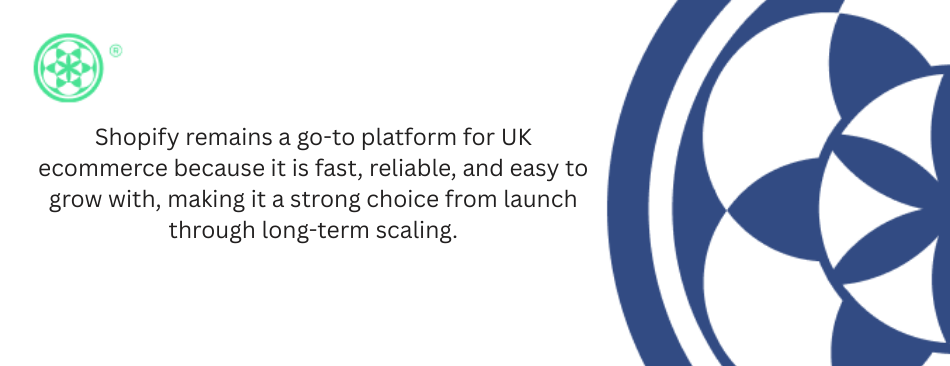
Why UK sellers choose Shopify
Shopify’s biggest strength is conversion. Its themes are optimised for mobile shopping, fast loading, and clear checkout flows, which directly impacts sales.
The platform also performs strongly for SEO, with clean URLs, solid site structure, and reliable uptime supported by a global infrastructure. For UK merchants selling internationally, Shopify makes cross-border selling far simpler than many alternatives.
Key features for ecommerce UK businesses
Shopify offers a large app ecosystem that covers marketing, subscriptions, loyalty, inventory sync, and fulfilment.
Integrations with Royal Mail, DPD, Amazon FBA, and third-party logistics providers are easy to set up, which is important for UK sellers managing domestic and international shipping. VAT settings are straightforward, making it easier to stay compliant as your order volume grows.
Payment methods supported
UK merchants can accept a wide range of payment options, including PayPal, Stripe, Klarna, Apple Pay, and Shop Pay. This flexibility helps reduce checkout friction and supports both local and international customers.
Pricing and costs
Plans typically start from around £25 per month, with higher tiers offering lower transaction fees and more advanced reporting. While apps can add to monthly costs, many sellers find the overall value strong compared to building and maintaining a custom ecommerce platform.
Migration and scalability
Migration to Shopify is well supported from all major ecommerce platforms. Products, customers, and order history can usually be transferred with minimal downtime. This makes Shopify a practical choice for businesses replatforming from older systems or outgrowing their current setup.
Overall, Shopify remains one of the most trusted ecommerce platforms in the UK for brands that want speed, flexibility, and room to grow without unnecessary complexity.
WooCommerce
WooCommerce is one of the most widely used ecommerce platforms in the UK for sellers who want full control over their store.
Built on WordPress, it powers a huge share of the self-hosted ecommerce UK market and appeals to businesses that prefer flexibility over convenience.
Best for: Stores that need flexibility and control
WooCommerce is ideal for merchants who want to customise every aspect of their ecommerce platform. It suits content-driven brands, SEO-focused stores, and businesses with unique workflows that don’t fit neatly into hosted platforms.
Why UK sellers choose WooCommerce
As an open-source platform, WooCommerce gives you ownership of your site, data, and hosting environment.
Its plugin ecosystem is enormous, covering everything from advanced SEO and subscriptions to complex shipping rules and B2B pricing. This makes it a strong choice for ecommerce UK businesses that want tailored functionality without platform restrictions.
Key features for ecommerce UK stores
WooCommerce integrates seamlessly with WordPress, which is a major advantage for UK brands relying on content marketing. It supports detailed product setups, flexible tax rules, and VAT configuration.
With the right plugins, sellers can connect to Royal Mail, DPD, Amazon FBA, and multi-warehouse fulfilment systems, making it viable for both small and growing operations.
Payment methods supported
UK merchants can accept payments through Stripe, PayPal, Klarna, Worldpay, and other regional gateways. This broad payment support allows sellers to offer familiar checkout options to UK customers while expanding internationally.
Costs and setup considerations
WooCommerce itself is free, keeping startup costs low. However, total costs depend on hosting, premium plugins, themes, and ongoing maintenance.
For businesses with in-house technical skills or access to a developer, WooCommerce can be one of the most cost-effective ecommerce platforms available.
Scalability and maintenance
WooCommerce can scale to high order volumes, but performance depends heavily on hosting quality and optimisation.
Regular updates, security management, and plugin compatibility are part of owning a WooCommerce store, which is why it suits businesses comfortable managing their own infrastructure.
For UK sellers who value control, customisation, and strong SEO foundations, WooCommerce remains one of the most powerful ecommerce platforms in the market.
Wix
Wix is a popular ecommerce platform in the UK for beginners, side projects, and small online stores that want to get up and running quickly.
It focuses on ease of use and visual design rather than deep technical control, which makes it appealing to first-time sellers.
Best for: Beginners and small stores
Wix is well suited to sole traders, local retailers, and small ecommerce UK businesses with a limited product range. It works best for sellers who prioritise speed, simplicity, and design over advanced customisation.
Why UK sellers choose Wix
The drag-and-drop website builder is Wix’s main advantage. Store owners can design pages visually without touching code, which lowers the barrier to entry for ecommerce. The learning curve is minimal, so many UK sellers can launch a store in a matter of days rather than weeks.
Key ecommerce features
Wix includes built-in product management, basic inventory tracking, discount tools, and order management.
It also supports simple SEO settings and mobile-friendly templates, which are essential for ecommerce UK stores targeting mobile shoppers. While integrations are more limited than on larger platforms, Wix covers most core needs for smaller operations.
Pricing and costs
Ecommerce plans typically start between £13 and £20 per month, depending on features and billing cycle. Hosting, security, and updates are included, which keeps ongoing costs predictable for new sellers.
Limitations to consider
Wix is not designed for complex or high-volume stores. Advanced inventory management, multi-warehouse setups, and deep third-party integrations can be restrictive compared to other ecommerce platforms. For this reason, many UK businesses eventually migrate to Shopify or WooCommerce as they scale.
For small ecommerce UK sellers who want an easy, visual way to start selling online, Wix remains one of the most accessible ecommerce platforms available.

Squarespace
Squarespace is a well-known ecommerce platform in the UK for brands that care deeply about visual presentation.
It’s often chosen by fashion, lifestyle, and creative businesses that want their store to feel like a polished brand site rather than a traditional online shop.
Best for: Fashion, lifestyle, and creative brands
Squarespace works best for businesses where aesthetics play a major role in purchasing decisions. Clothing labels, beauty brands, artists, photographers, and boutique retailers in ecommerce UK often gravitate toward it for its clean layouts and editorial-style design.
Why UK sellers choose Squarespace
Design is the platform’s strongest selling point. Squarespace offers some of the most refined templates among ecommerce platforms, with consistent typography, spacing, and mobile optimisation built in. For UK brands that want a premium look without hiring a designer, this is a major advantage.
Key ecommerce features
Squarespace includes built-in product management, inventory tracking, discount codes, and order handling. It also supports basic SEO tools, blogging, and email campaigns, which helps creative brands combine content and commerce in one place.
Shipping and tax tools cover standard ecommerce UK needs, though advanced logistics setups are more limited.
Payment methods supported
UK merchants can accept payments through Stripe and PayPal, along with Afterpay, branded as Clearpay in the UK. This allows stores to offer flexible payment options without complex setup.
Pricing and costs
Ecommerce plans generally range from around £16 to £30 per month, depending on the level of features and transaction fees. Hosting, security, and updates are included, which simplifies budgeting for small and mid-sized stores.
Limitations for scaling
Squarespace is not built for complex catalogues or multi-warehouse fulfilment. Integrations with third-party tools are more limited than on larger ecommerce platforms, which can become a constraint as order volume and operational complexity increase.
For UK sellers who want a visually striking ecommerce platform that’s easy to manage, Squarespace remains a strong choice within the top ecommerce platforms for design-led brands.
BigCommerce
BigCommerce is a powerful ecommerce platform aimed at UK businesses that are moving beyond early growth and into higher order volumes.
It is designed for scalability, performance, and complex catalogue management, making it a strong option for established ecommerce UK brands.
Best for: Scaling stores and high-volume sellers
BigCommerce works well for merchants processing consistent order volumes or planning rapid expansion. It suits brands that have outgrown entry-level platforms and need stronger operational features without moving to a fully custom build.
Why UK sellers choose BigCommerce
One of BigCommerce’s biggest advantages is the lack of platform transaction fees, which can make a noticeable difference at scale.
The platform is also well regarded for SEO, offering clean URL structures, advanced metadata control, and strong site performance. For ecommerce UK businesses competing in crowded markets, these factors help improve visibility and conversion.
Advanced ecommerce features
BigCommerce includes native support for multi-warehouse inventory, which is valuable for UK sellers using multiple fulfilment locations or third-party logistics partners.
It also offers robust B2B functionality, including customer groups, price lists, bulk pricing, and account-based purchasing. These tools make it suitable for wholesale and hybrid DTC-B2B models.
Payments and integrations
The platform integrates with major payment gateways and supports a wide range of third-party tools for marketing, fulfilment, and accounting. Connections with Amazon, ERP systems, and shipping providers are typically more advanced than on entry-level ecommerce platforms.
Pricing and costs
Plans usually start around £25 per month and scale up to roughly £79 per month, with pricing tiers linked to annual sales volume. While costs increase as revenue grows, many UK sellers find the absence of transaction fees offsets this over time.
Considerations before choosing BigCommerce
BigCommerce offers more built-in features than many platforms, which can make setup feel more complex for smaller teams. It is best suited to businesses that already have clear operational processes and growth plans.
For ecommerce UK brands focused on scale, efficiency, and long-term performance, BigCommerce stands out as one of the strongest ecommerce platforms available.
Magento (Adobe Commerce)
Magento, now branded as Adobe Commerce, is a highly flexible ecommerce platform built for large and complex online businesses.
In the UK, it is most commonly used by enterprise sellers that require deep customisation and have dedicated technical resources.
Best for: Enterprise sellers with in-house or agency development teams
Magento is best suited to large ecommerce UK operations with complex catalogues, bespoke workflows, and high transaction volumes. It is not designed for plug-and-play selling and works best when supported by experienced developers.
Why UK enterprises choose Magento
The platform’s main strength is customisation. Magento allows businesses to control nearly every aspect of their ecommerce experience, from checkout logic and pricing rules to integrations with ERP, CRM, and bespoke fulfilment systems.
For UK retailers with unique operational requirements, this level of control is difficult to match.
Advanced ecommerce capabilities
Magento supports multi-store, multi-language, and multi-currency setups from a single backend, which is valuable for UK brands operating across Europe or globally.
It handles complex VAT rules, large product catalogues, and advanced promotions with ease. Multi-warehouse inventory, headless commerce setups, and custom B2B features are all achievable with the right development approach.
Costs and investment level
Magento comes with significantly higher costs than most ecommerce platforms. Businesses must budget for hosting, ongoing development, security, and performance optimisation.
Adobe Commerce licensing can also add to the total cost, making it a long-term investment rather than a low-risk starting point.
Scalability and performance
When properly built and maintained, Magento can scale to extremely high traffic and order volumes. Performance depends heavily on infrastructure and development quality, which is why it is typically used by well-funded ecommerce UK brands with long-term growth strategies.
For enterprise-level sellers who need maximum flexibility and are prepared for the associated costs, Magento remains one of the most powerful ecommerce platforms available in the UK.
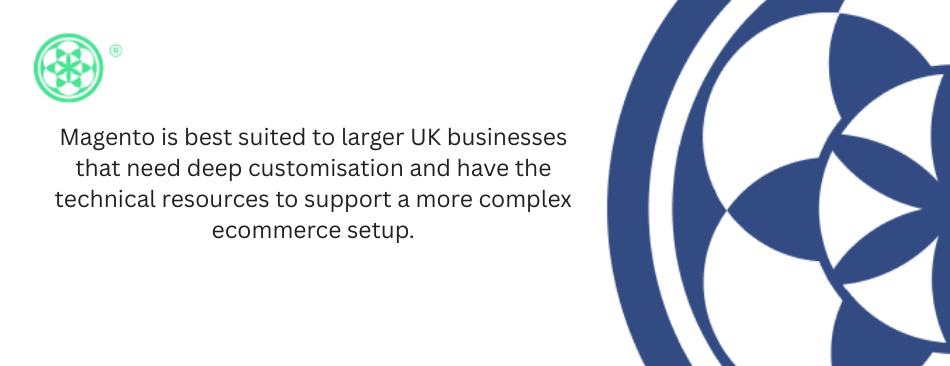
Big Cartel
Big Cartel is a lightweight ecommerce platform built specifically for independent creators and very small online shops.
In the UK, it’s popular with artists, makers, and sellers who want to start selling without dealing with complex ecommerce tools.
Best for: Creators and micro-stores
Big Cartel works best for artists, musicians, designers, and small-scale sellers with a limited number of products. It is ideal for side projects, drops, and passion-driven ecommerce UK stores rather than long-term, high-volume businesses.
Why UK sellers choose Big Cartel
Simplicity is the main appeal. The platform strips ecommerce down to the essentials, making it easy to list products, manage orders, and accept payments without a steep learning curve. For many creators, this keeps the focus on making and selling rather than managing technology.
Key ecommerce features
Big Cartel offers basic product listings, inventory tracking, discount codes, and order management. Customisation options are minimal compared to larger ecommerce platforms, but the tools provided are often enough for small catalogues and occasional sales.
Pricing and affordability
One of Big Cartel’s standout features is its free plan, which allows sellers to list a small number of products at no monthly cost. Paid plans remain affordable, making it accessible for creators testing ideas or selling intermittently.
Limitations for growth
Big Cartel is not designed for scaling. Advanced SEO tools, integrations, multi-channel selling, and complex shipping setups are limited. Many UK sellers eventually migrate to Shopify or WooCommerce as their audience and order volume grow.
For creators and micro-stores in ecommerce UK, Big Cartel remains one of the simplest and most affordable ecommerce platforms to get started.
ShopWired
ShopWired is a UK-built ecommerce platform designed for merchants who want more control and features than entry-level tools, without the complexity of enterprise systems.
It sits neatly between beginner platforms and heavy-duty solutions, making it a strong option for growing ecommerce UK businesses.
Best for: Serious UK sellers scaling beyond Shopify Lite or Wix
ShopWired works well for merchants who have outgrown basic builders but do not yet need a fully custom setup. It suits established UK retailers that want stronger inventory control, VAT handling, and operational features while keeping setup manageable.
Why UK sellers choose ShopWired
One of ShopWired’s key advantages is its focus on the UK market. Native integrations with UK couriers, accounting tools, and marketplaces reduce the need for third-party workarounds.
The platform offers a good balance between usability and depth, which appeals to sellers focused on long-term growth rather than rapid experimentation.
Key ecommerce features
ShopWired includes advanced product options, detailed VAT configuration, and solid stock management tools. It supports multi-channel selling, allowing UK merchants to connect their store with marketplaces and social channels.
The platform also performs well for SEO, giving sellers control over metadata and site structure.
Integrations and operations
Because ShopWired is built with UK businesses in mind, integrations with local services are more straightforward than on many global ecommerce platforms. This helps reduce friction around fulfilment, accounting, and compliance as order volumes increase.
Pricing and costs
Plans start from around £29.95 per month, positioning ShopWired in the mid-range of ecommerce platforms. For many UK sellers, the included features reduce reliance on paid add-ons, which consider total cost of ownership.
Things to consider
ShopWired’s ecosystem is smaller than Shopify’s, and international expansion tools are not as extensive. It is best suited to UK-centric ecommerce businesses rather than brands planning rapid global growth.
For ecommerce UK sellers who want a capable, locally focused ecommerce platform, ShopWired offers a practical step up from beginner solutions.
EKM
EKM is a UK-focused ecommerce platform built to help small and medium-sized businesses (SMEs) grow online without needing deep technical skills.
It’s particularly attractive to UK sellers who want managed support, built-in marketing features, and ongoing optimisation.
Best for: UK SMEs wanting managed ecommerce support
EKM is ideal for merchants who value guidance as much as the platform itself. Whether you’re launching your first online store or looking to grow an existing retail business in the UK, EKM’s support team and ecosystem are designed to make ecommerce easier.
Why UK sellers choose EKM
Unlike many DIY platforms, EKM blends platform features with hands-on assistance: you get access to an industry-experienced support team that can help with setup, migrations, and ongoing optimisations.
This managed approach attracts UK SMEs that don’t have dedicated ecommerce teams but still want professional polish.
Key ecommerce features
- Automatic theme refreshes — EKM keeps your store looking modern with built-in design updates that roll out without manual intervention.
- Marketing tools included — The platform provides email marketing, discount rules, SEO tools, and analytics right out of the box, so smaller sellers don’t need a bouquet of add-ons.
- Order and stock management — Core commerce workflows are streamlined for UK SMEs, with clear dashboards and workflows that don’t require third-party apps.
UK-centric strengths
EKM’s UK focus means features like VAT configuration, local payment methods, and courier integrations are designed with British retailers in mind — reducing setup friction and compliance headaches. The platform also offers resources and insights tailored to the UK ecommerce market.
Pricing and costs
EKM typically comes with tiered plans that bundle features, support, and optimisations. While not as low-cost as the most basic builders, many UK SMEs find the added support offsets the price, since it reduces external development and marketing spend.
Who should think twice?
If you’re a highly technical seller wanting full control or highly custom workflows, EKM’s managed nature might feel restrictive. For stores with complex inventory, multi-warehouse needs, or international aspirations beyond the UK, more flexible platforms might be a better fit.
For UK small and medium ecommerce businesses wanting a less technical, more guided path to selling online, EKM remains one of the best ecommerce platforms tailored to that audience.
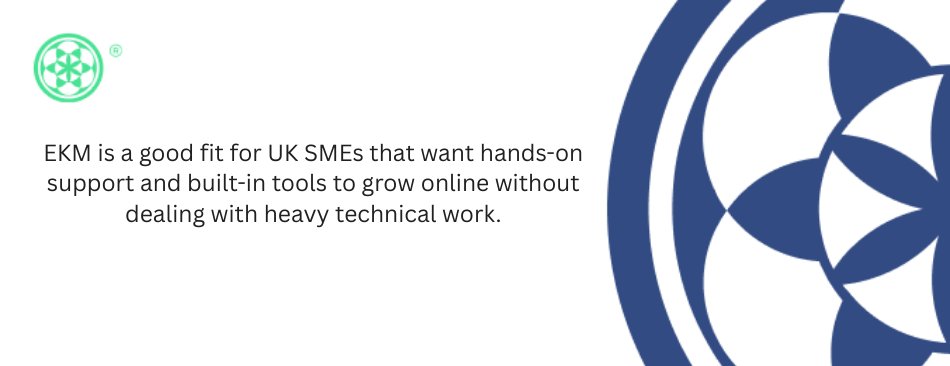
Bluepark
Bluepark is a UK-based, all-in-one ecommerce platform. It's designed for merchants who want built-in tools, strong support, and performance without relying on a bunch of paid add-ons.
It is one of the noteworthy options among top ecommerce platforms in the UK.
Best for: Speed-focused UK sellers needing pro support
Bluepark suits small to medium ecommerce UK businesses that care about performance and having a dedicated support team nearby. If you want a platform that includes most features out of the box and comes with real humans to help (not just forums), Bluepark fits well.
Why UK sellers choose Bluepark
UK merchants often choose Bluepark because of its all-inclusive feature set and local support.
Unlike some competitors that require lots of external apps, Bluepark provides core ecommerce functionality, from product management to marketing tools, without pricey add-ons. It’s also hosted on secure UK servers and backed by a team that’s well reviewed for responsiveness and expertise.
Key ecommerce features
Bluepark offers a wide range of built-in tools across ecommerce workflows:
- Advanced product and inventory management
- Customer account tools and segmented pricing
- SEO and marketing features like newsletters and discounts
- B2B selling options (e.g., trade pricing, pro forma invoices)
- Flexible themes and customisation without extra apps
All of this is included within the platform rather than needing multiple plugins.
Support and UK-centric benefits
One of Bluepark’s standout qualities in ecommerce UK is its UK-based support team. Across review platforms, merchants frequently call out the speedy, helpful service they receive via phone and email. This is a benefit many sellers appreciate when migrating from another host or troubleshooting technical issues.
Costs and pricing
Bluepark positions itself as an affordable but robust alternative to bigger players. Its packages generally include everything you need to sell online without transaction fees, and the tiered plans scale from smaller stores to larger businesses needing more products and features.
Considerations
While powerful, some users find the platform’s broad set of options a bit overwhelming at first, especially if they’re transitioning from simpler builders. The learning curve may be steeper than on very basic ecommerce platforms, though the extra tools pay off as your business grows.
Ecwid
Ecwid is a flexible ecommerce platform that’s a bit different from most others on this list.
It's built first and foremost to add online selling to an existing website, social page, blog, or marketplace, while also giving you the option to create a simple standalone store if needed.
Best for: Adding a store to a website or social channels
Ecwid shines when you already have a website and want to start selling without rebuilding it on a full ecommerce platform.
UK sellers who run blogs, WordPress sites, or business websites often use Ecwid to turn their existing presence into a revenue-generating store.
Why UK sellers choose Ecwid
The biggest advantage of Ecwid is its flexible embedding capability. You can place an entire storefront, individual product cards, or “Buy Now” buttons on any site that supports HTML embeds.
This makes it much easier to monetise traffic without technical overhead or migrating to a different platform.
Key ecommerce features
Ecwid includes all the core tools needed to run an online store: product management, inventory tracking, order processing, secure payments, and automated emails. And because it’s cloud-based, you don’t need to host ecommerce infrastructure yourself.
It also supports multichannel selling. You can list and sync your products on social platforms like Instagram or Facebook, as well as marketplaces, all from one control panel.
Where Ecwid fits in for UK sellers
- Add ecommerce to an existing presence: Embed an online shop into your current UK business website without redesigning it.
- Social selling: Seamlessly sell on Facebook, Instagram, and TikTok while keeping inventory synced.
- Standalone option: If you don’t have a site yet, Ecwid’s built-in “Instant Site” lets you spin up a simple store quickly.
Limitations to be aware of
While Ecwid is powerful for embedding and multichannel selling, it isn’t as feature-rich as standalone ecommerce platforms like Shopify for large catalogues, and some SEO tools are more basic.
Shift4Shop
Shift4Shop is an ecommerce platform designed for sellers who want a wide range of built-in features without relying heavily on paid add-ons or third-party apps.
It appeals to businesses that prefer an all-in-one setup rather than assembling their store piece by piece.
Best for: Stores wanting built-in tools without heavy add-ons
Shift4Shop works well for merchants who want marketing, SEO, and sales tools included from day one. It suits ecommerce UK sellers who are comfortable with a more feature-dense platform and want to avoid ongoing app subscription costs.
Why sellers choose Shift4Shop
One of Shift4Shop’s key strengths is the depth of its native functionality. Many tools that require plugins on other ecommerce platforms are built directly into the system. This can simplify store management and reduce long-term costs for businesses that use a broad range of ecommerce features.
Key ecommerce features
Shift4Shop includes built-in SEO controls, blogging tools, discount and promotion management, customer groups, and abandoned cart recovery. Inventory management and order workflows are designed to support growing stores without needing extensive customisation.
Design and usability
The platform offers a variety of themes and layout options, though its interface can feel more complex than beginner-focused ecommerce platforms. This makes it better suited to sellers who are willing to spend time configuring their store to match their needs.
Considerations for UK sellers
While Shift4Shop provides strong out-of-the-box tools, some UK-specific integrations and payment options may require additional setup compared to platforms built primarily for the UK market. It is best suited to sellers who value feature depth over simplicity.
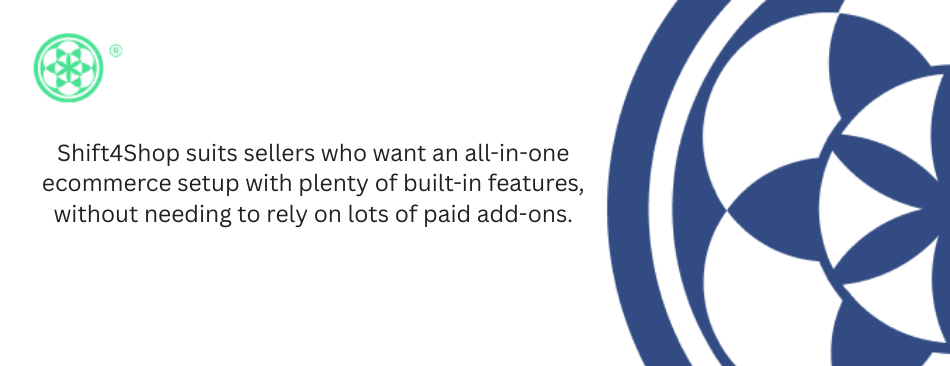
PrestaShop
PrestaShop is an open-source ecommerce platform that’s especially popular with merchants selling across multiple countries and languages.
It gives UK sellers a way to build highly custom, EU-friendly stores without being locked into a hosted service.
Best for: Multilingual EU-focused commerce
PrestaShop works well for UK businesses that sell to customers across Europe or globally and need native support for multiple languages and currencies.
It’s a great choice if your store’s audience is distributed outside the UK and you want fine-grained control over localisation and international settings.
Why UK sellers choose PrestaShop
The open-source nature of PrestaShop means you own your code and can tailor your store’s functionality without platform-level restrictions. Its modular architecture lets you enable or extend features through add-ons, making it flexible for diverse market needs.
Key ecommerce features
PrestaShop includes:
- Built-in support for multiple languages and currencies
- Strong tax and VAT configuration tools, which matters for cross-border UK-EU selling
- Customisable product types, promotions, and pricing rules
- A marketplace of modules for payments, shipping, SEO, analytics, marketplaces, and more
Because the platform isn’t tied to a single host, you can choose hosting providers and performance plans that match your traffic and growth stage.
Design and usability
PrestaShop offers a range of themes and a back-office interface that’s more technical than simple drag-and-drop builders. This makes it better suited to businesses with development expertise or access to technical support.
Payments and integrations
You can add popular payment gateways such as Stripe, PayPal, Worldpay, and regional EU processors. Modules also exist for common European logistics providers, making it easier to bridge UK and EU fulfilment and delivery.
Costs and considerations
While the core platform is free, total costs depend on hosting, premium modules, themes, and developer support. Like other open-source solutions, PrestaShop requires more hands-on management than hosted ecommerce platforms, so it’s a good fit for teams with technical capability.
OpenCart
OpenCart is a lightweight, open-source ecommerce platform. It’s popular with budget-conscious UK sellers who need a reliable online store without unnecessary complexity.
It’s designed to deliver essential ecommerce functionality while keeping setup and ongoing costs low.
Best for: Budget stores needing essential features
OpenCart is ideal for small to medium shops that want to sell online with the basics covered, such as product catalogues, order management, payment processing, and simple shipping options, without investing in more expensive hosted solutions or heavy customisation.
Why UK sellers choose OpenCart
OpenCart’s appeal lies in its simplicity and low barrier to entry. The core platform is free to use, and basic store functionality can be extended through a range of community-built extensions.
This makes it a strong option for first-time sellers, side projects, and small ecommerce UK businesses that want to keep costs predictable.
Key ecommerce features
OpenCart includes:
- Product and category management
- Order and customer management
- Basic reporting and sales analytics
- Support for multiple stores from a single admin panel
It also offers multi-language and multi-currency capabilities, which can be useful even for UK merchants aiming at modest international audiences.
Payments and extensions
OpenCart supports popular payment gateways like PayPal and Stripe out of the box. A marketplace of extensions lets you add more payment methods, shipping modules, and marketing tools as needed. While not as extensive as larger ecommerce platforms, the ecosystem is sufficient for many essential use cases.
Design and usability
Themes are available through third-party providers, and the admin interface is functional and straightforward for users with basic ecommerce knowledge. It’s less polished than hosted builders, but its simplicity can be an advantage for stores that don’t need advanced design tools.
Costs and considerations
Although the software itself is free, you’ll need to budget for hosting, security, and any premium extensions you choose. Some technical setup may be required, so having basic development support can make the process smoother.
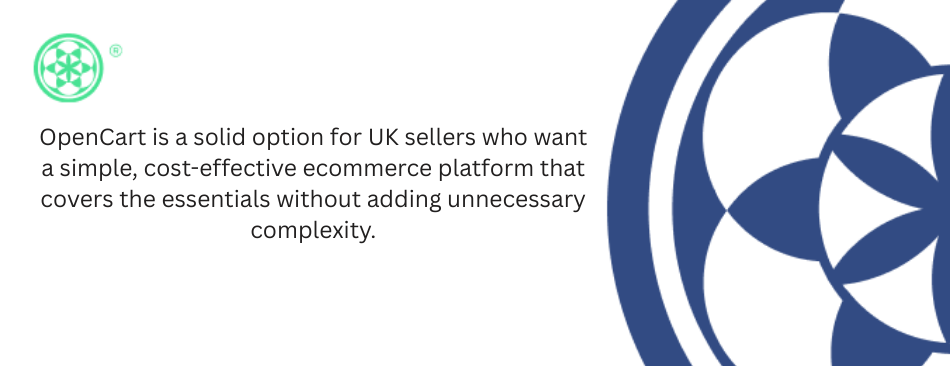
Squarespace Commerce
Squarespace Commerce is the ecommerce-focused tier of Squarespace’s website builder, designed for brands that want beautiful, minimalist online stores without the complexity of larger systems.
In the UK, it’s especially popular with lifestyle and premium brands that prioritise visual storytelling as part of the shopping experience.
Best for: Minimalist catalogues and premium brands
Squarespace Commerce works particularly well for stores with smaller product ranges. Think boutique fashion labels, artisan goods, beauty brands, and creative portfolios.
It’s ideal for UK sellers who want a sleek, design-forward shop that showcases products like a digital storefront.
Why UK sellers choose Squarespace Commerce
The platform’s standout strength is design. Squarespace templates are known for their elegance, strong typography, and consistency, making them perfect for premium brands where aesthetics matter as much as functionality.
You get a polished look and feel right out of the box without needing a designer.
Key ecommerce features
Squarespace Commerce includes:
- Beautiful, mobile-optimised product pages
- Inventory management for smaller catalogues
- Built-in SEO tools and blogging
- Discount codes, gift cards, and basic marketing features
These tools help quality-focused UK sellers present products with visual finesse and keep customers engaged without technical overhead.
Payments and customer options
The platform supports major payment gateways, including Stripe and PayPal. In the UK, it also offers Afterpay via Clearpay, which lets customers split payments. That’s a valuable option for lifestyle buyers.
Pricing and cost
Squarespace Commerce plans start in the mid-range of ecommerce platforms. Prices generally range from around £16 to £30 per month, including hosting, security, and updates, making it a predictable cost for quality online retail.
Considerations for growth
While Squarespace Commerce is great for smaller catalogues and visually driven brands, it’s not built for complex inventory, advanced B2B workflows, or extensive third-party extensions.
UK sellers with larger product lines or growing operational needs may eventually outgrow its core functionality.
For UK merchants looking to combine premium design with straightforward ecommerce, Squarespace Commerce stands out as a top choice among ecommerce platforms that marry style with simplicity.
Volusion
For UK retailers who want an ecommerce platform with strong analytics dashboards and clear insight into store performance, Volusion offers a solid option within the landscape of available ecommerce platforms.
Best for: retailers wanting strong analytics dashboards
Volusion is an ecommerce platform that appeals to UK retailers who want clear business insights and data driven decision making. It provides detailed analytics and sales reporting that help merchants understand performance and optimize their store.
Why UK sellers choose Volusion
Volusion is known for its focus on metrics and business intelligence. The platform includes robust dashboards that make it easy to track sales, customer behaviour, product performance and marketing results in one place.
This can help UK sellers plan inventory, improve conversion and refine promotional strategies based on data rather than guesswork.
Key ecommerce features
Volusion includes tools for product management, order processing, customer segmentation and promotions.
Its analytics centre gives a visual view of revenue trends, conversion rates and key performance indicators that are often harder to access on other ecommerce platforms without additional apps.
Design and usability
The platform offers a range of themes and customisable layouts that suit a variety of retail sectors.
While not as design focused as some competitors, it balances ease of use with functional clarity that lets merchants spend less time managing tech and more time running their business.
Payments and integrations
Volusion supports major payment gateways and standard integrations for shipping, accounting and marketing. This allows UK sellers to connect core systems and get a more holistic view of their ecommerce operations.
Considerations
Volusion is best for retailers that value analytics and reporting as core parts of their ecommerce toolkit. It may not offer as many advanced features out of the box as some larger platforms and might require integrations for specialised needs.
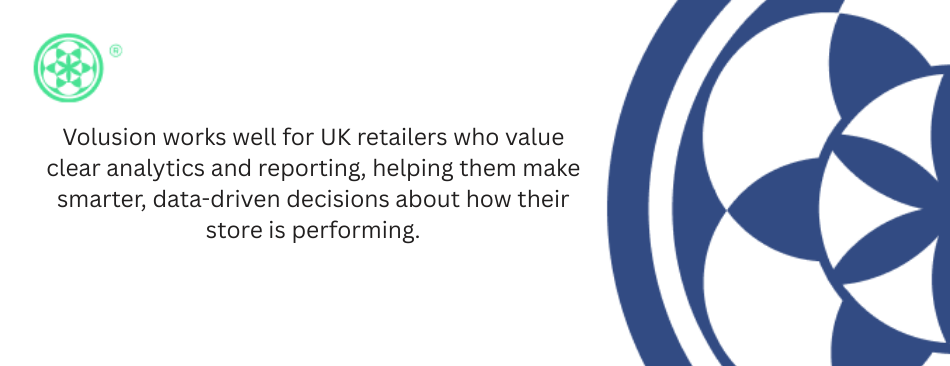
Wix eCommerce
For UK retailers that want a simplified selling experience both online and in person, Wix eCommerce offers a solid all-in-one solution.
Best for: simple all-in-one ecommerce and POS
Wix eCommerce is a good choice for UK sellers who want an easy and affordable way to sell online and in person. It combines a simple online store with built-in point of sale tools, so small shops and local retailers can manage both digital and physical sales from one platform.
Why UK sellers choose Wix eCommerce
Wix is known for its intuitive drag-and-drop website builder. For ecommerce UK sellers, this means you can build a store with minimal technical skills and start selling quickly. The platform includes the most essential tools you need from the start without relying on lots of add-ons or plugins.
Key ecommerce features
Wix eCommerce provides product and inventory management, order processing, mobile-friendly themes and basic SEO tools to help your products show up in search. The integrated POS system lets sellers take payments in person at markets, pop-ups or retail locations, with sales syncing back to the main Wix dashboard.
Payments and checkout
UK merchants can accept major payment methods through the Wix Payments gateway, as well as PayPal and other supported options. The streamlined checkout helps keep the buying process simple for customers.
Pricing and costs
Plans are competitively priced and include hosting, security and support. Because everything is bundled, UK sellers know upfront what they will pay each month without unexpected platform fees.
Considerations for growth
Wix eCommerce works best for stores with straightforward needs and modest catalogues. As your business grows, you might find limitations in advanced inventory features, customisation and integrations compared with more specialised ecommerce platforms.
Square Online
For UK sellers blending physical and online retail, Square Online provides an integrated, easy-to-manage ecommerce solution.
Best for: retailers merging POS and online selling
Square Online is ideal for UK retailers that want unified ecommerce and point of sale (POS) systems.
It lets you sell online and in person with the same product catalogue, inventory tracking and customer data, making it a strong choice for shops with both digital and physical storefronts.
Why UK sellers choose Square Online
Square Online is built around Square’s broader payment ecosystem. For UK sellers already using Square POS hardware in a shop, cafe or market stall, it’s a natural extension that keeps everything in one place. Orders, payments and inventory update in real time, which helps reduce errors and saves time.
Key ecommerce features
Square Online includes product management, order processing, automated tax calculation and basic SEO tools. It also supports local pickup and delivery options that are handy for UK customers who prefer flexible fulfilment.
Because everything syncs with Square’s POS, you get one dashboard for sales across channels.
Payments and checkout
Payments are processed through Square, which supports major methods like debit and credit cards. Additional options such as digital wallets may also be available depending on your setup. The unified system means simpler reconciliation and reporting.
Pricing and costs
Square Online offers plans that include hosting and security, and it can be an affordable entry point for smaller retailers. Using Square’s POS hardware and payment processing together can reduce complexity, though transaction fees still apply.
Considerations for growth
While Square Online is excellent for multichannel sellers focused on simplicity, advanced ecommerce features, such as complex B2B tools or deep customisation, are more limited than on larger ecommerce platforms.
For many UK retailers, however, the convenience of a single system outweighs those limits.
Connect your ecommerce store to Bezos and unlock same-day fulfilment, lower shipping costs, and seamless UK/EU expansion.
Start scaling today.
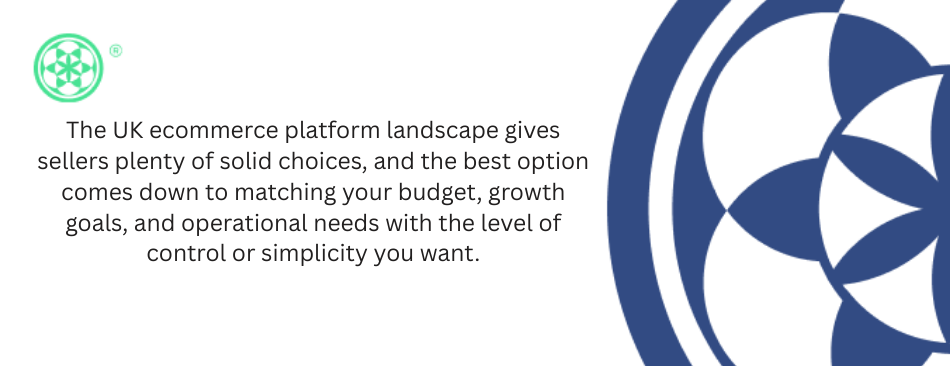
Conclusion
The UK ecommerce platform landscape offers strong options for every type of seller. Shopify continues to lead in overall adoption, WooCommerce remains the go-to choice for self-hosted flexibility, and platforms like BigCommerce, ShopWired, and Bluepark are increasingly popular with high-growth UK brands. The right ecommerce platform depends on your budget, growth plans, catalogue size, preferred payment methods, fulfilment needs, and how much control or simplicity you want.
Choosing a platform is only one part of the equation. As your store scales, fulfilment becomes just as important as design or features. That is where Bezos.ai helps UK retailers stay competitive, with fast, reliable, and scalable logistics that support growth without adding operational complexity.
FAQ
What are the best ecommerce platforms for UK businesses?
Shopify, WooCommerce, BigCommerce, Wix, Squarespace, ShopWired, and Bluepark are among the top ecommerce platforms for UK businesses, with the right choice depending on scale, budget, and feature requirements.
Which ecommerce platforms support UK payment gateways?
Most leading ecommerce platforms support PayPal, Stripe, Apple Pay, Google Pay, and Klarna. Shopify and ShopWired offer some of the strongest and easiest UK-focused payment integrations.
Can I migrate my store from Shopify to another platform?
Yes. Most ecommerce platforms provide migration tools or third-party services that allow you to move products, customers, and order data with minimal disruption.
Which ecommerce platform is the most cost-effective in the UK?
WooCommerce when self-hosted, along with Wix and Big Cartel, typically has the lowest startup costs for UK sellers, particularly for small stores and new businesses.
Which platform is best for international shipping from the UK?
Shopify, BigCommerce, and ShopWired are well suited to international shipping, with strong integrations for global couriers and fulfilment partners.
Which ecommerce platform offers the best customer support in the UK?
ShopWired, EKM, and Bluepark stand out for UK-based customer support, while Shopify provides round-the-clock global support via live chat and help centres.
Which ecommerce platform scales best for high-traffic UK retailers?
BigCommerce, Shopify, Magento, and ShopWired are among the best ecommerce platforms for handling large catalogues, high traffic, and growing order volumes in the UK.
As a part of the Bezos.ai team, I help e-commerce brands strengthen their fulfilment operations across the UK, Germany, the Netherlands and the US. I work with merchants that want to simplify logistics, reduce costs and expand into new markets. I’m also building my own e-commerce brand, which gives me practical insight into the challenges founders face. In my writing, I share fulfilment strategies, growth lessons and real-world advice drawn from both sides of the industry.












